homework 2
homework2

ExercisesPart one1. What is acoustic phonetics? [人大2003研]【答案】Acoustic phonetics is a technical area of linguistics. It is the study of sound waves made by the human vocal organs for communication.2. Auditory phonetics studies how sounds are perceived by the speaker.[清华2001研]【答案】FPart two:一、术语解释IPA [南开大学2004研]【答案】IPA: the abbreviation of International Phonetic Alphabet, which is devised by the International Phonetic Association in 1888. IPA is a set of symbols which can be used to represent the phones and phonemes of natural languages.二、简答题What are the three parts of the vocal organs (3 points)? [清华2001研]【答案】The pharynx, the mouth and the nose are the three parts of the vocal organs.三、论述题Is English a language that uses a phonetic alphabet system? Explain briefly why or why not with examples. (15 points) [北外2004研] 【答案】The Phonetic Alphabet is a system of letters and symbols that are used to represent the individual sounds of a language. English is a language that uses a phonetic alphabet system because it is a phonographic language by nature. There are mainly three types of language concerning its writing system: ideographic language which uses symbols (ideograms) to represent whole words or concepts (ideas), with Chinese as an example; syllabic language in which words or concepts are represented by syllable, with Japanese syllabic system as an example; phonographic language which uses special alphabetic or other typographical characters to express the sounds of an actual spoken utterance in writing, with many European languages as examples. English uses alphabetic script to represent certain single type sound. For example, the sound which is written as sh in English can be expressed by symbol [∫], as in ship; and the sound that is written as c can be expressed by the symbol of [k], as in cup.四、选择题Of the three cavities, is the most variable and active in amplifying and modifying speech sounds. [北京第二外国语学院2004研]A. nasal cavityB. pharynx cavityC. oral cavity【答案】C五、判断正误1. When the vocal folds are apart, the air can pass through easily and the sound produced is said to be voiced. [大连外国语学院2008研] 【答案】F2. Of the three cavities, pharynx cavity is the most variable and active in amplifying and modifying speech sounds. [北京第二外国语学院2007研]【答案】FPart three一、术语解释1. Cardinal vowel [四川大学2006研,大连外国语学院2008研] 【答案】The cardinal vowels are a set of vowel qualities arbitrarily defined, fixed and unchanging, intended to provide a frame of reference for the description of the actual vowels of existing languages.2. Glottal Stop [四川大学2006研]【答案】V ocal tract is composed of oral cavity, nasal cavity and pharynx. When the vocal folds are totally closed, no air can pass between them. The result of this gesture is the glottal stop.3. Bilabial consonant [四川大学2007研]【答案】Bilabial consonants refer to consonants which are made with the two lips.4. V oiceless [西安交通大学2008研]【答案】When the vocal folds are apart, the air can pass through easily and the sound produced is said to be voiceless. For example, consonants [p, s, t] are produced this way, so they are voiceless consonants. “V oiceless”is defined in contrast with “voiced”. Consonants [b, z, d] are voiced consonants.二、简答题1. Mention a labiodental sound in English. Tell what speech organs are involved in producing labiodental sounds. (4 points) [北京第二外国语学院2007研]【答案】/f/ (or /v/), the upper front teeth and the lower lip are involved.2. What are the differences between voiced sounds and voiceless sounds in terms of articulation? [南开大学2004研]【答案】When the vocal cords are spread apart, the air from the lungs passes between them unimpeded. Sounds produced in this way are described as voiceless. Consonants [p, s, t] are produced in this way. When the vocal cords are drawn together, the air from the lungs repeatedly push them apart as it passes through, creating a vibration effect. Sounds produced in this way are described as voiced. [b, z, d] arevoiced consonants.三、选择题1. Of the consonants /p/, /t/, /k/, /f/, /m/, /z/ and /g/, which has the features of voiceless and velar? [对外经济贸易大学2005研]A. /k/B. /p/C. /g/D. /t/【答案】A2. The vowel is a low back vowel. [西安外国语学院2006研]A. /i:/B. /u/C. /æ/D. /a:/【答案】D3. Point out which item does not fall under the same category as the rest, and explain the reason in ONE sentence. [南京大学2008研] A. /f/ B. /z/ C. /v/ D. /k/ [Focus on manner of articulation]【答案】D (Reason: A, B and C are fricatives, but D is a plosive.)五、填空题1. Consonant articulations are relatively easy to feel, and as a result are most conveniently described in terms of place and of articulation. [北京第二外国语学院2008研]【答案】manner2. are produced by constricting or obstructing the vocal tract at some place to divert, impede, or completely shut off the flowof air in the oral cavity. [中山大学2006研]【答案】consonants六、判断正误1. Bilabial consonant is produced when the obstruction is partial and the air is forced through a narrow passage. [对外经济贸易大学2006研]【答案】F2. The sound segments are grouped into consonants and vowels. [大连外国语学院2008研]【答案】T七、音标题Work out the distinctive features of the following sounds. (10%)[南开大学2007研]1.[t h]2.[w]3.[v]4.[ð]5.[l]【答案】1. [t h] aspirated voiceless alveolar stop2. [w] voiced bilabial approximant3. [v] voiced labio-dental fricative4. [ð] voiced dental fricative5. [l] voiced alveolar lateral一、术语解释1. Phoneme [人大2006研,浙江大学2005研,上海交通大学2007研]【答案】Phoneme refers to the abstract element of sound, identified as being distinctive in a particular language. For example, in English, /p/ is described as a phoneme.2. Minimal pairs [武汉大学2005研,浙江大学2004研,四川大学2007研,上海交通大学2006研,北京航空航天大学2008研,北京第二外国语学院2006研]【答案】Two words which are identical in every way except for one sound segment that occurs in the same place in the string. For example, the English words bear and pear constitute a minimal pair as they differ in meaning and in their initial phonemes /b/ and /p/. 3. Free variation [武汉大学2004研]【答案】Free variation is the interchangeable relationship between two phones, in which the phones may substitute for one another in the same environment without causing a change in meaning. For example, the final consonant of cup may not be released by some speakers so there is no audible sound at the end of this word. In this case, it is the same word pronounced in two different ways : [kʰʌpʰ]and [kʰʌp] (The diacritic “┐”indicates “no audible release ” in IPA symbols.)4. Allophone [四川大学2008研,北京交通大学2007研]【答案】Allophone refers to variants of the same phoneme, which are in complementary distribution and bear phonetic similarity.5. Coarticulation[武汉大学2008研,四川大学2006研,南开大学2007研]【答案】Coarticulation refers to the phenomenon that sounds continually show the influence of their neighbors. For example, in lamb, when a is followed by m, the velum will begin to lower itself during the articulation of a so that it is ready for the following nasal. When such simultaneous or overlapping articulations are involved, we call the process coarticulation. If the sound becomes more like the following sound, it is known as anticipatory coarticulation. If the sound displays the influence of the preceding sound, it is perseverative coarticulation.6. Broad and narrow transcription [中山大学2006研]【答案】When we use a simple set of symbols in our transcription, it is called a BROAD TRANSCRIPTION. And the use of more specific symbols to show more phonetic detail is referred to as a NARROW TRANSCRIPTION. Both are phonetic transcriptions so we put both forms in square brackets [ ].7. Complementary distribution [武汉大学2008研,南开大学2007研]【答案】When two sounds never occur in the same environment, they are in complementary distribution. For example, the aspirated English stops never occur after [s], and the unaspirated ones never occur initially. Allophones of the same phoneme are usually in complementary distribution. The allophones of /p/, for instance, are also in complementary distribution. The unaspirated [p] occurs after /s/, while the aspirated [ph] occurs in all other environments except after /s/.二、论述题What are phonemes, phones and allophones? Explain their relationship with examples from English or Chinese. (15 points) [北外2005研]【答案】A phoneme is a minimally distinctive set of sounds in a language that can signal a difference in meaning. It is an abstract phonological unit represented or realized by a certain phone in a particular phonetic context. A phone is an individual phonetic unit or segment that occurs in speech. The speech sounds we hear and produce during linguistic communication are all phones. Each of the set of phones which correspond to a single phoneme of a language is called an allophone. Phonemes are placed between slant lines (/ /)and phones are placed between square brackets ([ ]). Allophones of the same phoneme generally occur in different contexts and never distinguish one word from another. For example, when we pronounce the two words peak and speak, we are aware that the sound [p] is pronounced differently, in the word peak, it is pronounced with a strong puff of air stream; but the same stop sound is pronounced slightly differently in the word speak, where the puff of air is withheld a little. The [p] sound in peak is called an aspirated [ph] and the [p] sound in speak is an unaspirated [p]. There is a slight difference in the way they are pronounced, but such a difference does not give rise to difference in meaning. So /p/ is a phoneme in the English sound system, and it can be realized differently as aspirated or unaspirated in different contexts. The phoneme /p/ in English can be realized as aspirated [ph] and unaspirated [p], which are allophones of the phoneme /p/.三、选择题1. Which of the following is true of an allophone? [对外经济贸易大学2005研]A. A phone can be the allophone of all English vowel phonemes.B. There are no restrictions on the distribution of an allophone.C. There is no possibility of an allophone becoming a phoneme.D. An allophone changes the meaning of the word.【答案】C2. Which of the following CANNOT be considered as minimal pair? [大连外国语学院2008研]A. /ai/-/ɔi/B. /p/-/b/C. /s/-/θ/【答案】C3. Point out which item does not fall under the same category as the rest, and explain the reason in ONE sentence. [南京大学2007研] A. resolution B. resident C. restart D. resignation [Focus on the pronunciation of “s”]【答案】C ( Reason: in A, B, D, “s”are all pronounced as [z], while in C “s”is pronounced as [s].)四、填空题transcription should transcribe all the possible speech sounds, including the minute shades.[北京第二外国语学院2004研]【答案】narrow五、判断正误1. A phoneme in one language or one dialect may be an allophone in another language or dialect. [清华2000研,清华2001研] 【答案】T2. Broad Transcription is intended to symbolize all the possible speech sounds, including the minute shades. [北京第二外国语学院2003研]【答案】F3. Phonetic similarity means that the allophones of a phoneme must bear some morphological resemblance. [大连外国语学院2008研]【答案】F补充:此题型还常考free variation和complementary distribution,phone和phoneme的区别。
广西平南县上渡镇大成初级中学八年级英语上册 Unit 2 How often do you exer

---- Does he go shopping? ---- No, he never goes shopping.
【辨析】 maybe与may be maybe是副词,在句子做状语。may be 是情 态动词may与动词原形be一起构成句子的谓语 动词意为“可能是”,它们有时也可互换。
c. some times是名词词组, 意为“几次, 几倍”。 I met him some times in the street last month. The factory is some times larger than that one.
3.How come ? 为什么呢? 这是英语中的一个口语,相当于汉语的“为什
(what / usually/ do/ weekends)
• How often does your best friend exercise ?
(how often / best friend / exercise)
• what do you usually do after school
?
(what / usually / do / after school)
go shopping /do some shopping eat breakfast
arrive late for class
eat in the classroom
practice your English watch TV
do homework
3a Complete the questions with do or does.
人教版英语七年级下册UNITE2

A
That's a funny time for breakfast! 那个时间吃早饭真有意思哟!
time常常和介词“for”搭配,表示“做......的时间”。
We don't have too much time for sports. 我们没有太多时间开展体育活动。 Time for dinner, children go and wash your hands, please. 孩子们,饭好了。请去洗手吧。
16
B
Match the verbs in column A with the words in column B. Then use the phrasses to complete the sentences.
A
taste
clean
take B your teeth my room
have
get
一般说来半个小时以内,常常用介词past,表示“几点过几分” 例如: a quarter past three三点一刻; half past six六点半 半小时过后多用介词to,表示“差几分到几点” 例如: a quarter to nine九点差一刻或八点四十五分。
7
A
In the evening,I either watch TV or play computer games. 晚上我要么看电视要么玩电脑游戏
up adv.向上
get up 起床;站起
dress v.穿衣服n.连衣裙
Hale Waihona Puke get dressed 穿上衣服
brush v.刷;刷净 n.刷子
tooth n.(plteeth)牙齿
shower n.&v.淋浴n.淋浴器(间) take a shower 洗淋浴
中职基础模块英语第二册教案

月 日 第1单元 第5、6课时 总第5、6课时
课题
Unit 1 what a wonderful time!
教学目标
(包括知识目标、能力目标、 情感目标)
1、To learn some phonetics
2、To learn the grammar "Exclamations"
教材分析
(包括教学重点、教学难点)
Grammar: Exclamation
We use exclamations to express our surprise, anger, or other strong emotions. Exclamations are often constructed with how/what or with so/such. For example: How cold it is!
5.Practice the dialogues in pairs.
6.Make dialogues about traveling Act out the dialogues in pairs.
Sum up:
1.Situation expressions;
nguage points
Assignment:
教 案 纸
月 日第一1一单元第3、4课时 总第3、4课时
课题
Unit1what a wonderful time!
教学目标
(包括知识目标、能 力目标、情感目标)
1、To learn the passage.
2、To understand the passas and expressions;
Sum up:
1.Situation expressions;
Unit4 Can you do my homework 教科版(广州)(含答案)
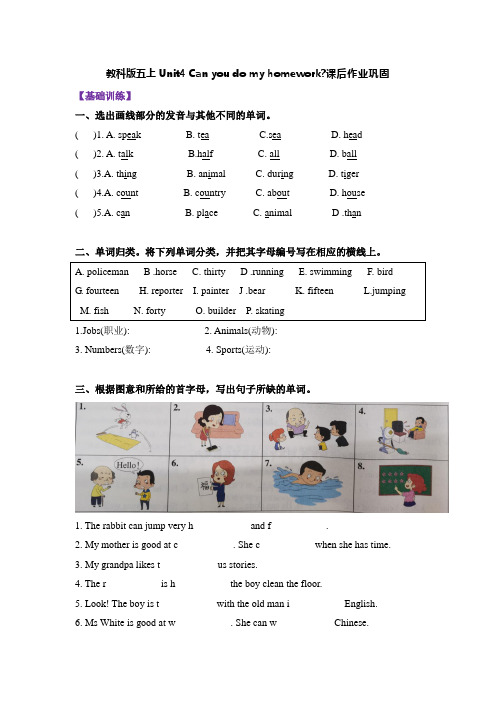
教科版五上Unit4 Can you do my homework?课后作业巩固【基础训练】一、选出画线部分的发音与其他不同的单词。
( )1. A. speak B. tea C.sea D. head( )2. A. talk B.half C. all D. ball( )3.A. thing B. animal C. during D. tiger( )4.A. count B. country C. about D. house( )5.A. can B. place C. animal D .than二、单词归类。
将下列单词分类,并把其字母编号写在相应的横线上。
A. policeman B .horse C. thirty D .running E. swimming F. bird G. fourteen H. reporter I. painter J .bear K. fifteen L.jumping M. fish N. forty O. builder P. skating1.Jobs(职业):_______________2. Animals(动物):_______________3. Numbers(数字):___________4. Sports(运动):_________________三、根据图意和所给的首字母,写出句子所缺的单词。
1. The rabbit can jump very h___________ and f___________.2. My mother is good at c___________. She c___________when she has time.3. My grandpa likes t___________ us stories.4. The r___________is h___________the boy clean the floor.5. Look! The boy is t___________ with the old man i___________English.6. Ms White is good at w___________. She can w___________ Chinese.7. My father can s___________.He s___________very fast.8.What are you doing? —I’m c___________ the flowers.四、根据中文意思,将下列句子补充完整。
2022年外研版七年级下Module2 Unit 1同步练习(附答案)

Module 2 Unit 1 Ⅰ. 根据句意及图画提示完成单词(10分)1. My sister often plays the __________ in her free time.2. Little Tom __________ a bike to school in a hurry because he is late.3. My aunt __________ English in a middle school.4. —Can Jack play__________?—Yes, he can play very well.5. —What’s on the__________?—Let’s go and see.Ⅱ. 单项填空(10分)1. My American teacher can ________ Chinese very well.A. speaksB. speakC. talkD. speaking2. —Can you ride a horse, Tony?—________.A. Yes, I canB. Yes, I amC. No, I canD. No, he can not3. Don’t worry about ________. He can do it well by himself.A. heB. himC. hisD. her4. I can pl ay ________ violin but I can’t play ________ baseball.A. a; theB. the; theC. the; /D. /; the5. Would you like ________ for a walk after supper?A. goB. goingC. to goD. wentⅢ. 句型转换(10分)1. Her father can play basketball and table tennis. (改为否认句)Her father ________ ________ basketball ________ table tennis. 2. Lucy can dance well. Can you dance well? (改为同义句)Lucy can dance well. ________ ________you?3. Don’t be worried about me. (改为同义句)Don’t ________ ________ me.4. Mike can play basketball well. (改为一般疑问句并作肯定答复) —________ Mike ________ basketball well?—________, he________.5. I want to join the Dance Club. (改为同义句)I _______ _________ ________ join the Dance Club.Ⅳ. 补全对话(10分)从方框中选择最正确选项完成对话, 有两项多余。
哈工大人工智能原理习题homework-2
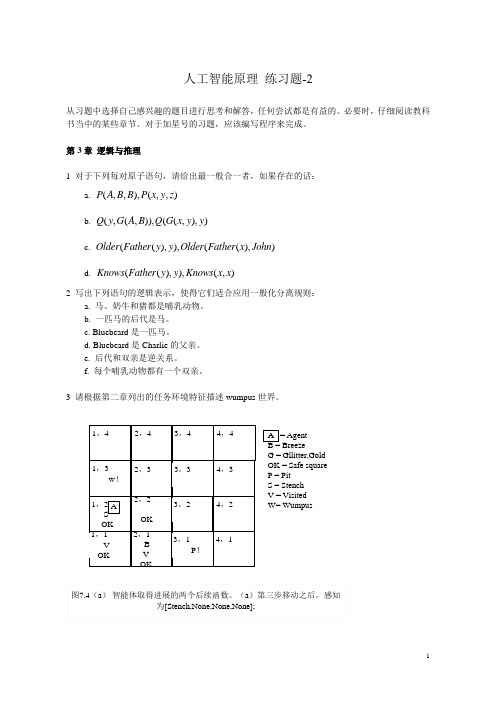
人工智能原理 练习题-2从习题中选择自己感兴趣的题目进行思考和解答,任何尝试都是有益的。
必要时,仔细阅读教科书当中的某些章节。
对于加星号的习题,应该编写程序来完成。
第3章 逻辑与推理1 对于下列每对原子语句,请给出最一般合一者,如果存在的话:a. (,,),(,,)P A B B P x y zb. (,(,)),((,),)Q y G A B Q G x y yc. ((),),((),)Older Father y y Older Father x Johnd. ((),),(,)Knows Father y y Knows x x2 写出下列语句的逻辑表示,使得它们适合应用一般化分离规则:a. 马、奶牛和猪都是哺乳动物。
b. 一匹马的后代是马。
c. Bluebeard 是一匹马。
d. Bluebeard 是Charlie 的父亲。
e. 后代和双亲是逆关系。
f. 每个哺乳动物都有一个双亲。
3 请根据第二章列出的任务环境特征描述wumpus 世界。
1,42,43,44,41,3 w !2,33,34,31,2 S OK 2,2OK3,24,21,1 V OK 2,1B V OK3,1 P !4,1A图7.4(a ) 智能体取得进展的两个后续函数。
(a )第三步移动之后,感知为[Stench,None,None,None];A = AgentB = BreezeG = Gllitter,GoldOK = Safe squareP = PitS = StenchV = Visited W= WumpusA4 假定智能体已经前进到图7.4(a)(如上图)所示的位置,感知到的情况为:[1,1]什么也没有,[2,1]有微风,[1,2]有臭气。
它现在想知道[1,3]、[2,2]和[3,1]的情况。
这3个位置中的每一个都可能包含陷阱,而最多只有一个可能有wumpus。
按照图7.5的实例,构造出可能世界的集合。
一般过去时2
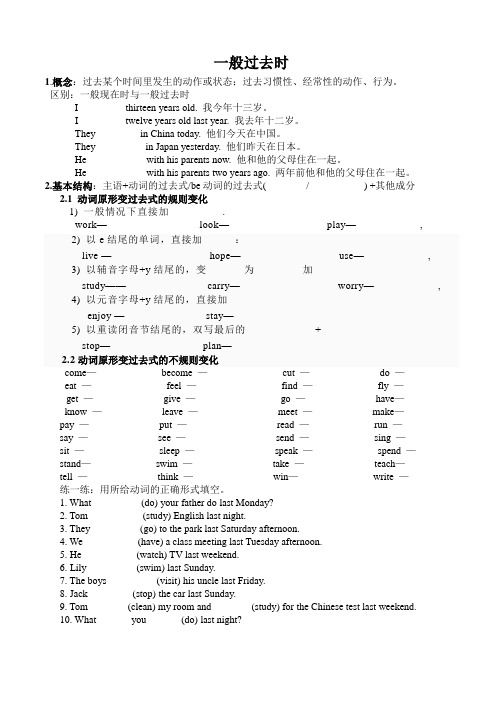
一般过去时1.概念:过去某个时间里发生的动作或状态;过去习惯性、经常性的动作、行为。
区别:一般现在时与一般过去时I_________ thirteen years old. 我今年十三岁。
I_________ twelve years old last year. 我去年十二岁。
They ________ in China today. 他们今天在中国。
They _________ in Japan yesterday. 他们昨天在日本。
He ___________ with his parents now. 他和他的父母住在一起。
He ___________ with his parents two years ago. 两年前他和他的父母住在一起。
2.基本结构:主语+动词的过去式/be动词的过去式(________/___________) +其他成分2.1 动词原形变过去式的规则变化1) 一般情况下直接加__________.work—___________ look—____________ play—____________,2) 以e结尾的单词,直接加______:live —___________ hope—___________ use—____________,3) 以辅音字母+y结尾的,变_______为_________加_________study——__________ carry—____________ worry—____________,4) 以元音字母+y结尾的,直接加________enjoy —__________ stay—_____________5) 以重读闭音节结尾的,双写最后的_____________+_______stop—___________ plan—___________2.2动词原形变过去式的不规则变化come—_________ become —___________ cut —__________ do —_________ eat —__________ feel —_____________ find —________ fly —_________ get —_________ give —____________ go —__________ have—________ know —_______ leave —___________ meet —_________ make—_________ pay —___________ put —_____________ read —_________ run —_________ say —__________ see —_____________ send —_________ sing —__________ sit —__________ sleep —___________ speak —_________ spend —________ stand—_________ swim —____________ take —__________ teach—________ tell —__________ think —____________ win—___________ write —_________ 练一练:用所给动词的正确形式填空。
第二次翻译练习Homework
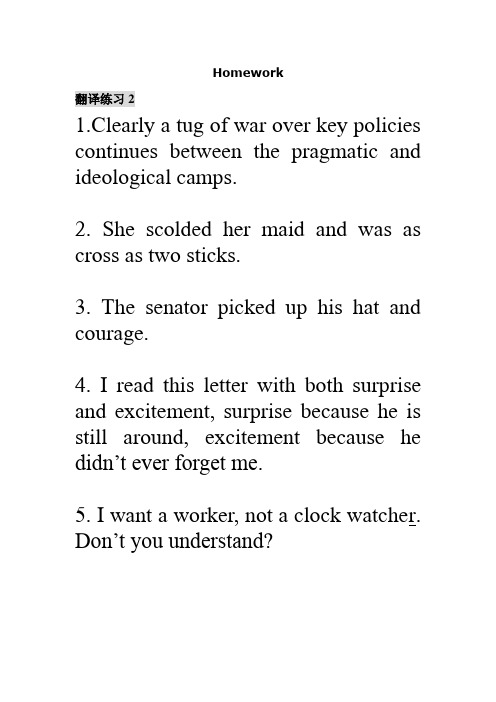
Homework翻译练习21.Clearly a tug of war over key policies continues between the pragmatic and ideological camps.2. She scolded her maid and was as cross as two sticks.3. The senator picked up his hat and courage.4. I read this letter with both surprise and excitement, surprise because he is still around, excitement because he didn’t ever forget me.5. I want a worker, not a clock watcher. Don’t you understand?6. A good teacher should have his head in the clouds sometimes, but his feet always on the ground.7. Everybody said how well the new Secretary was doing, but old Mr. Carr said shortly, “Yes. New brooms sweep clean.”8. World-famous for his works he was never personally well known, for throughout his life he avoided publicity.9. He wants a lawyer who understands his case, who sympathizes with him and who has been there himself.10. Because of limited insurance coverage, many people will have to look to their own resources -- both emotional and financial -- to care for aninfirm or recovering relative at home.11. The history of a tree from the time it starts in the forest until the boards which it yields are used, would form an interesting and, in many instances, an exciting story.12. I can see three different types of composers in musical history, each of whom creates music in a somewhat different fashion.13. To petrol we owe the existence of the motor-car, which has replaced the private carriage drawn by the horse. To petrol we owe the possibility of flying.参考译文:1.Clearly a tug of war over key policies continues between the pragmatic and ideological camps.不言而喻,注重务实的和强调意识形态的两大营垒还会在重大政策上争吵不休.tug of war 本意为"拔河", 在此处为比喻用法, 指"双方势均力敌,争吵不休", 直译显然不妥, 故采用释义法.)2. She scolded her maid and was as cross as two sticks.她骂斥自己的女仆,而且脾气非常不好。
辽师大版英语六年级下册 Unit2

1.T: In Miss Lin’s class,Linda is absent today. Miss Lin is calling her. Let’s listen ,discuss and fill in the blanks.
a. _____ is absent today. ...
2.Show time
1.Play the recorder of the text. Let the Ss follow it.
2.Read the dialogue by yourself then read in pairs. Act the dialogue.
Step 3.Practice and Consolidation
1.Look, read and write
Who’s absent today?
Show time.
2.A joke
a.Play the recorder of the text. Let the Ss follow it.
several Ss to sum up what we have learned in this class.
学生活动及设计意图
批注
Step 1.Warming up
1.Greetings
2.Sing a song ‘ If you are happy’.
Step 2.Presentation and Drill
Listen and say.
1.T:In Miss Lin’s class,two students are absent today. What’s the matter with them?
人教版pep 小学英语五年级上册Unit 2过关检测卷
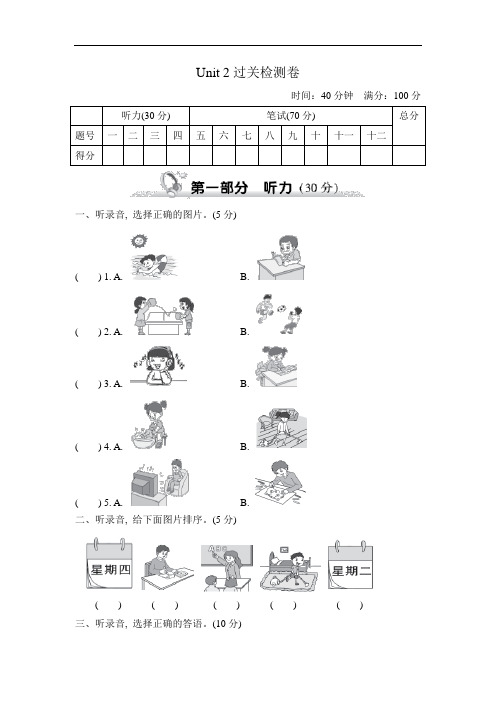
Unit 2过关检测卷时间:40分钟满分:100分听力(30分) 笔试(70分) 总分题号一二三四五六七八九十十一十二得分一、听录音, 选择正确的图片。
(5分)() 1. A. B.() 2. A. B.() 3. A. B.() 4. A. B.() 5. A. B.二、听录音, 给下面图片排序。
(5分)()() () () ()三、听录音, 选择正确的答语。
(10分)() 1. A. It's Wednesday. B. It's July.() 2. A. Yes, I have. B. Yes, I do.() 3. A. I play sports. B. I like sports.() 4. A. He's strong. B. He likes maths.() 5. A. I have PE, Chinese and art. B. I play computer games.四、听录音, 填表。
(10分)Name Time ActivitiesZhang Peng on Saturdays 1. do ________ 2. __________ play ping-pong 3. on________ draw pictures 4. ________ TV 5. play ________五、找出下列单词中不同类的一项。
(5分)() 1. A. science B. class C. English() 2. A. kind B. tired C. often() 3. A. sleep B. eat C. sometimes () 4. A. park B. wash C. read() 5. A. tired B. play C. listen六、选词填空, 补全句子。
(5分)1. We ________ have enough money. (has/don't)2. I need to do some ________. (shops/shopping)3. ________ comes after Wednesday. (Tuesday/Thursday)4. Wu Yifan often ________ TV on the weekend. (watch/watches)5. I want a box of ________. (crayon/crayons)七、单项选择。
Homework 2

Homework 2: 英译汉、汉译英1.省译法1)We expect that the delivery will be effected at your earliest convenience.2)It’s a pleasure for us to offer you the goods as follows.3)To give you a general idea of the various kinds of cotton piece goods now available for export, we enclose a brochure and a price list.2.增译法1)Inflation was and still is the No. 1 problem of that country.2)Courage in excess becomes foolhardiness, affection weakness, thrift avarice.3.词性转换法1)企业组织可以选择在报纸或杂志上登广告,简要介绍所招聘职位的情况并征集应聘者的自荐信。
(动词翻译成名词)2)If major problems exist and goals are not being achieved, then changes need to be made in the company’s organizational or managerial structure. (名词翻译成动词)3)We are especially grateful to you for arranging the meeting for us with the Machinery Trading Delegation at such short notice. (形容词翻译成动词)4.被动语态1)The damage was covered by the insurance company.2)The Chinese trade delegation was given a hearty welcome.3)He preferred to be assigned something concerning trade to do.4)英文版学校简介运用形容词来代替名词。
人教版八年级上 Unit 2 复习提纲

一.重点单词1.housework(n.)家务/homework(n.)作业(不可数)2.twice (n.)两次→two(n.)二→second(num.)第二once(n.)一次→one(n.)一→first (num.)第一3.program(n.) →programs(n.)节目4.full(adj.)满的→full(adj.)饱的5.swing (v.)→swung(v.)摆动(过去式)→swing(n.)秋千6.maybe(adv. ) →perhaps也许;可能(近义词)7. hardly (adv) 几乎不(否定词)→hard (adj)硬的;困难的→hard(adv)努力地;猛烈地study/rain hard8.online(adj/adv)在线的→offline(adj)离线的9.least(adj/adv.)最少;最小→little(原型)→less(比较级)10.health (n. )健康→healthy(adj. )健康的→unhealthy不健康的11.through(prep.)→by(prep.)通过12.mind(v.)介意→mind(n.)心智13.die(v.)→dies(v.)三单→died(v.)过去式→dead(adj.)死的→death(n.)死亡14.write(v.)→wrote(v.)写→writer(n.)作家15.dentist (n.)→dentists(n.)牙医16.magazine(n.)→magazines(n.)杂志17.points(n.)重点;分数→point(v.)→pointed(v.)指(过去式)18.always(100%)总是→usually(70%)通常→often(50%)经常→sometimes (20%)有时→hardly ever(5%)几乎不→never(0%)从不二.重点短语Section A1.help (sb.) with housework帮助做家务help ( to ) do sth.2.on weekends在周末3.how often多久一次how soon多久以后how long多久;多长how far 多远4.hardly ever几乎从不5.once a week每周一次6.twice a month每月两次7.every day每天everyday 每天的8.be free有空/自由的9.go to the movies去看电影10.go online =use the Internet用互联网11.swing dance摇摆舞12.play tennis打网球13.stay up late熬夜;睡得很晚14.at least至少/ at most 最多15.have dance and piano lessons上舞蹈课和钢琴课16.go to bed early早点睡觉17.play sports进行体育活动18.be good for对……有好处be good at sth.擅长....be good with sb. 与...相处好19.go camping去野营20.not…at all一点儿也不……21.in one’s free time在某人的业余时间22.the most popular最受欢迎的23.such as比如;诸如24.go to the dentist for teeth cleaning去看牙医25.more than多于;超过/ less than少于26.want sb. to do sth.想让某人做某事Section B1.visit (visited) a science museum 参观博物馆2.Sb.+find +that从句. …发现……3.spend time with sb.和某人一起度过时光4.It’s+ adj.+ to do sth. 做某事是……的5.ask sb. about sth.向某人询问某事ask sb. (not) to do sth. 叫…不要做某事ask sb. for sth. 向某人要求…6. junk food 垃圾食品7. be full of= be filled with…装满的;饱的8. be busy doing sth.= be busy with sth. 忙于(做)某事9.be surprised to do对做某事感到惊讶be surprised at sth.对某事感到惊讶to one’s surprise 让某人吃惊的是10.keep/stay healthy= keep in good health保持健康11.by doing sth. / through sth. 通过做某事12.at least three or four times a week至少三或四次13.the best way to do sth.做某事的最好方式三、重点句子Section A1.How often do you exercise? 你多久锻炼一次?I exercise three times a week. 我一周锻炼三次。
大学英语2英语听力答案

大学英语2英语听力答案【篇一:新视野大学英语第二册听力答案】=txt>第二册unit 1 international clock talkshort conversations1- 5.bdcdc6-10.cbbaclong conversation1-5.ddabcunderstanding a passage1-5.cdbcbmovie speech1.upset2.sickw4.harmless5.break6.replaced7.memories8.natural9.birthday 10.appreciatestory-retelling1. sit quietly and listen to him2. a blank stare3. put it a different way4.speak up in class5. in turn/ a great deal ofhomework listeningtask 1 1-5.d c b d btask 2 1-5.c a b a ctask 31.the age, size and future2.seventy years ago3.increase with distancete that month5.a light year6.distances in space7.other measurements8.support the idea9.slow down and break up 10.or possibly even olderunit 2all that glitters is olympic goldshort conversations1.b2.b3.c4.c5.c6.a7.a8.a9.c 10.along conversation1.d2.b3.c4.d5.dunderstanding a passage1.c2.b3.c4.d5.dmovie speech1.training2.touch5.trouble6.fighting7.three10.borrowhomework listeningtask 1 1.d 2.c 3.d 4.b 5.atask 2 1.a 2.b 3.c 4.b 5.dtask 31.on the ball2.did something unexpected3.at the job or activity4.hit it out of the park3.understand4.appreciate 8.honest 9.cry5.think it over6.is very successful9.how much it is worth10.close to my selling price新视野大学英语听说教程【第二版】第二册unit 3 pros and cons of mixed marriagesshort conversations1.d2.a3.b4.c5.d6.a7.d8.b9. a 10.blong conversation1.a2.b3.d4.d5.aunderstanding a passage1.b2.d3.d4.a5.bmovie dialog1.night2.definitely3.love4.wise5.my wife6.267.died8.youngest9.goes by10.gotten oldlistening and speaking1.physically ok2.to the kitchen3.a bowl of ice cream4.i don’t need to write it down5. a plate of bacon andeggssupplementary listeningtask 1 1.a 2.b 3.d 4.c 5.dtask 2 1.b 2.d 3.b 4.c 5.atask 31.they care about2.performed marriages .3.wait longer to get married4.bring people together5.plan a blind date6.follow their culturaltraditions7.meant for the other 8.establishing a relationship9.improve their chances10.meet someone over the internet新视野大学英语听说教程【第二版】第二册unit 4 a hunk of burning loveshort conversations1.d2.b3.c4.a5.b6.d7.a8.c9.c 10.blong conversation1.b2.a3.c4.d5.bunderstanding a passage1.c2.b3.d4.b5.amovie speech5.delight6.gathering7.natural8.special9.welcoming10.remindinghomework listeningtask 1 1.a 2.c 3.a 4.b 5.btask 2 1.d 2.c 3.a 4.c 5.btask 31.answer a question2.to be admitted3.copies of all school records4.the results of the tofel5.minimum acceptable tofel score6.additional english training7.conditionally accept students8.taking regular class9.provides more information10.successfully pass classes新视野大学英语听说教程【第二版】第二册unit 5 enough of worries and tearsshort conversations1.c2.d3.a4.c5.a6.b7.d8.d9.d 10.clong conversation1.b2.d3.a4.d5.aunderstanding a passage1.d2.c3.b4.a5.cmovie speech1.everything the light touches2.rises and falls3.will risewith you 4.shadowy place5.never go there6.getting your way7.exists together 8.respect all creatures 9.let meexplain【篇二:新标准大学英语2翻译、听力答案】class=txt>1. nowadays in china, it’s no longer so hard for high school graduates to go to university,because there are three times as many universities as there were 20 years ago. but to be admitted by a first-class university, you still need to be more competitive than your peers.2. it is worthwhile to spend money on this project, for the career skills you acquire in the processare bound to help improve your prospects in your search for a job and all your efforts will eventually pay off.3. though i can learn teamwork by working side by side with other volunteers, i need to pay forthe participation. i have to acknowledge that i am now spending more time doing part-time jobs to save up for the project, which makes me feel a shortage of time.4. different sports have different requirements in terms of height, age, strength and stamina.therefore, there are as many types of athletes as there are sports. there can be no doubt that anyone who wants to get some exercises can find the right sport.listening:unit one: listening inpassage 2 : 8: choose the best way to complete the sentence 1-----5: b d d b aunit 3: listening inpassage 1:3: correct the sentences according to the passage1. , but the policeman2. if you’re going to bite someone3. another 2,0004. talking to the newspaper5. sure what was happeningpassage 2:6. complete the factfilename of the victim: anna blackdate the attack took place: just over a week agotime of the day: about sevengender: maleitem: mobile phonehelped the victim: two mentime to arrive: five minutes7. 1-----5: b a a b dunit 4: listening inpassage 1 :3. complete the incident reportcampus address: south block, room 18date of the fire: november 10time of the fire: 11 pmcause of the fire: he had a telephone conversation with his girlfriend and forgot about the chipshe was deep-frying, and then the chips and oil caught fire.to arrive: ten minutesdamage done: the fire ruined the cooker, two kitchen units and one wallpassage 2 : 4. 1-----5: d a a b c8. 1. just as many2. how they behave3. a gardening programme4. do very well5. to say to thatunit 5 : listening inpassage 1 :2. complete the sentences:1. businessman; 11 years old2. first name; his second name3. the same age as4. terrible four years; survives5. his japanese friend6. strength; courage3. 1-----5 : b d a d bunit 6 : listening inpassage 2 : 7: 1-----5: a b c d d【篇三:全新版大学英语第二版听说教程2听力原文及答案】s=txt>unit 1 sports part a]listening strategyidentifying numbersnumbers appear very often in every kind of listening material. the ability to catch the exact numbers spoken in english is an important but difficult skill for a chinese learner. a good way isto practice over and over again the pronunciation of the numbers, particularly the different ways to say thirteen and thirty, fourteen and forty, etc. it also helps to practice writing down the numbers you hear quickly in numerical forms, without translating them into chinese. youre going to hear a passage about michael jordan, a retired american professional basketball player.listen carefully and fill in the blanks with the missing numbers. michael jordan is the greatest basketball player of all time. he was born on feb.17, 1963, in brooklyn, new york. he is 1.98 meters tall and weighs 216 pounds. jordan joined the chicago bulls team for the 1984 season. in the 1986 season he shot 3041 points, the third highest score ever. he was named nba slam dunk champion(扣篮冠军)in 1987 and won the most valuable player award in 1988, an honor repeated four times in the next ten years to 1998. jordan guided his team to win six nba championships during the 1990s, scoring 45 points during the sixth and last game of the 1998 nba finals. in 1999, he was named the greatest north american athlete of the 20th century. jordan left the nba at the beginning of the 1993-1994 nba season to pursue a career in baseball. since his baseball game wasnt quite as good as his basketball games, he finally gave it up to rejoin the bulls in 1995. yet, after playing for five more years, he once again announced his retirement in 1999. but he returned for two more nba games in 2001 as a member of the washington wizards.[ti:unit 1 part b]listening tasks a conversationwhy dont you join me at the gym sometime?exercise 1listen to the conversation and choose the right answers to the questions you hear.peter: hi laura. where are you heading with that big bag?laura: hi, peter. im off to the gym. ive got to stay in shape, you know. i try to go three times a week, but im busy so i cant always make it.peter: i know more women who work out than men. whats the main reason you work out? for your health, or to look good?laura: to be honest, for both. with women, good looks are always a very important consideration. peter: if they werehonest, most men who work out would admit that they also do it to look better, and not merely for health reasons.laura: how about you? do you get any regular exercise?peter: i do a lot of walking, for exercise and enjoyment sometimes ten to twenty kilometers at a time but i never go to the gym like you do.laura: well, walking is good exercise. how about sports?peter: not since my school days. i used to love playing baseball, but its impossible to get enough people together for a game now. mostly i just watch sports on tv.laura: i play tennis fairly regularly with my friends, and sometimes go swimming and cycling by myself.peter: oh, i forgot about that. i go cycling sometimes too. and i often go swimming on vacation, but only recreational swimming.laura: why dont you join me at the gym sometime? i can get you a guest pass. peter: well, maybe someday, but im pretty lazy about things like that. questions1. what do you know about peter?2. where might the two speakers be having this conversation? speaking tasks pair worklisten to the following conversations and repeat after the recording. then role-play them with your partner.conversation 1a: whats your plan for this evening?b: well, theres a good game at the stadium but i havent got a ticket yet.a: im going to the gym. would you like to come along? i can get a guest pass for you. b: thats wonderful. id always wanted to work out in the new gym. thank you very much. conversation 2 a: hi, xiao wang. fancy meeting you here! how are you doing?b: cant complain. im busy with my experiments in the lab. but after work i often play some sports.a: like what?b: like swimming, running and sometimes tennis.a: tennis? thats my favorite game. say, whatre you doing this weekend? b: nothing particular. i guess ill probably just work in the lab. a: come on. you need to relax. what about a game of tennis? b: ok.conversation 3a: are you doing anything special tomorrow, bob? b: not really. why do you ask?a: some of us are going motorcycling. would you like to join us? b: motorcycling? ive never done that. isnt it a bit dangerous? a: maybe, but its really exciting.b: i enjoy jogging. its more relaxing.a: thats a good form of exercise. it can help you stay in shape. b: yes, its also safer.now make similar conversations according to the given situations. use the structures and expressions above in your conversations where appropriate[ti:unit 1 part c]test your listeningyoure going to hear five short conversations. listen carefully and choose the right answers to the questions you hear.1. w: i like playing basketball, volleyball and table tennis. what about you? m: well, tennis is my favorite sport. q: what sport does the man like?2. w: you dont like boxing very much, do you? m: its far from being my kind of sport. q: what does the man mean?3. w: i think yesterdays football game was quite exciting. what about you, john?m: you said it. but it was a bit long.q: what does the man think about the football game? 4. w: do you like to play chess?m: i like the game, but i dont play it often enough. im afraid im not a very good chess player. q: what does the man mean?5. m: i knew the names of all the football players and the dates of all the games in my high schooldays. but recently i have failed to keep up with football. w: now you are busy with your golf games.q: what do you know about the man from the conversation?unit 2 food and drinks part alistening strategylistening between the linespeople do not always say directly what they mean. very often, we have to listen between the lines. the english languageoffers many ways for people to imply, rather than directly state, their meaning. to find out what a speaker really means, we canrely on such things as the context, the meaning of an idiom, and the intonation used. for example, if someone says i have an essay to write in answer to an invitation to go somewhere, we can infer from the context that he cannot accept the invitation. and if someone says andrew passed with flying colors in reply to an inquiry about how andrew did on a test, we can infer from the meaning of the idiom to pass with flying colors that andrew did very well on the test. often, intonation also helps to reveal the real meaning of a message. for example, he is very clever said with an ironic tone means just the opposite. you are going to hear eight short conversations between two speakers.listen carefully and write down yes or no to each of the following questions. 1. m: have you ever been to that big restaurant opposite the school gate? w: yes, many times.whenever my friends come to visit me, ill take them there to eat. 2. w: is there something wrong, sir?m: my wife and i have been kept waiting for nearly an hour for our meal. 3. w: where is the cake i made this morning?m: we ate it, mom. can you make another one for us?4. w: i hear you like chicken very much.m: next to beef.5. m: have you tried this wine before?w: no, never. its my first time, but its really to my taste. 6. w: john, do you want a soda? m: soda? i think it tastes like medicine. 7. w: why, the fish is left almost untouched. m: well, it would be good if it were less salty. 8. m: hi, sue, would you like to eat out tonight?w: oh, id really like to, but my sister may come to visit me this evening..[ti:unit 2 part b] listening tasks a conversationwhat about dining out?exercise 1listen to the conversation and complete the following sentences. peter: hi, kate.kate: hi, peter. how have you been? peter: oh, ok, i guess. and you?kate: not too bad. we havent seen each other for a while, have we?peter: no, we havent. so that makes me ask. do you have any plan for this saturday? kate: no, not yet, i dont think so. why?peter: what do you think about getting together and going out to dinner this weekend? kate: that would be great. do you have any particular place in mind?peter: well, i think id like to eat something thats not too heavy. ive been eating a little too much lately.kate: me too.peter: i love italian food, but maybe we should skip that this time. they always seem to serve somuch food in italian restaurants, and you end up eating more than you wanted to.kate: chinese food would be good.peter: yes, or maybe some japanese sushi. that style uses alot of natural flavors, and not much oil or cream or heavy sauces.kate: yes, either of those choices would be good. lets just meet on saturday night, and decide then where to eat.peter: thats fine by me.speaking tasks pair worklisten to the following conversations and repeat after the recording. then role-play them with your partner.conversation 1(at the school canteen) a: what a crowd!a: thats true. im starving and i cant wait. id rather not stand in a long line. b: why dont we have some fried noodles?a: noodles are sold at no. 2 box. no queue there, you see. b: thats great. (at no. 2 box) counter hand: what can i get you? a: one plate of fried noodles, please. b: make it two.counter hand: ok. two plates of fried noodles. anything else? a: how much is the tomato soup? counter hand: its free. it goes with the noodles. a: i see. (to b) do you want any soup? b: yes. a: (to counter hand) two bowls of soup, please. conversation 2 (at a fast food restaurant)counter hand: what can i do for you?customer: ill have one order of chicken nuggets and a chicken sandwich. counter hand: anything to drink? customer: a small sprite. no ice, please. counter hand: okay. for here or to go? customer: for here. conversation 3(at a chinese restaurant)waiter: are you ready to order?a: do you have any recommendations?waiter: yes. the sichuan style crispy whole fish is very good.its todays special.a: mary, would you like to try that? i hear its very good.b: why not? and id like shrimp in black bean sauce, too. its my favorite. waiter: okay. anything else?a: what about some vegetables, mary? b: yes. how about spinach? a: spinach is fine with me. waiter: anything to drink? a: yes. id like one bud light, please. whatll you have, mary? b: orange juice, please. waiter: one bud light and one orange juice. is that right? a: right.now make similar conversations according to the given situations. use the structures and expressions above in your conversations where appropriate[ti:unit 2 part c]test your listeninglisten to the conversation and choose the right answers to the questions you hear. a: well, here we are, not too crowded.b: great! lets order quickly so we can chat a little. a: ok. what are you in the mood for?b: something light. i had a huge breakfast and im still full. a: there are three salads. or you could have soup and a sandwich. b: what are you having? a hamburger, i suppose.a: no, actually i ate out last night. we had pizza at pizza hut, then a late snack at kentucky fried chicken.b: oh, dear. well, maybe you should have a salad.a: yes, i think so. look, the daily special is spaghetti. that sounds good. b: oh, the prices are great too. ill have that as well. a: now lets decide on drinks.b: ill just have coffee and a glass of iced water. a: italian food needs red wine, you know. b: but we have to go back to work. a: ok, a coke for me then.b: here comes the waitress. let me order first. questions1. what is the relationship between the two speakers?2. where does the conversation take place?3. what will they order?unit 3 weather part alistening strategylistening for important detailsbesides understanding the main idea of a listening text, we often find it necessary to grasp the important details as well. what counts as important details depends on the kind of information we want. generally speaking, if we are listening to the narration of an event, we need to sharpen our ears not only for what happened, but also when and where, how and why it happened. in listening to a weather report, on the other hand, the important details we should watch out for are the current weather conditions, temperature, and weather outlook. youre going to hear two short passages about weather. while listening, pay attention to such details as the weather conditions, temperature, weather outlook, damage caused by bad weather and so on, and write them down in note form.then complete the exercises in your book.1. the weather today: a fine day is in store nearly everywhere, with the best of the sunshine in southern and central areas of britain. a pleasant day, then, with long sunny periods developing. there will be light winds with a maximum temperature of 18 degrees celsius, 64 degrees fahrenheit. look at the outlook for the next few days: it will become mostly cloudy with heavy showers moving in from the west.2. a storm in changchun, capital of northeast chinas jilin province, claimed four lives on sunday. the storm lasted about three hours from around 8 p.m. the winds reached speeds of over a hundred miles an hour, causing serious damage and a widespread power failure.[ti:unit 3 part b] listening tasks a conversationdid you hear the forecast?exercise 1listen to the conversation and choose the right answers to the questions you hear. alan: oh, look at the sky, michelle! its starting to get cloudy.michelle: i see it. i hope it doesnt rain. i thought it was going to be a fine day today.alan: thats certainly what the department was hoping for when they chose today as the date for the annual picnic.michelle: you cant have a picnic without good weather. you need sunshine for all the eating and games and entertainment. alan: yeah, sunshine — but not too much! do you remember last year?。
剑桥少儿英语预备级(下册)Unit2

football =soccer
足球
down下 up上
谁在玩什么?
足球 羽毛球 棒球 篮球
你们班的运动标志。
今日重点单词:
badminton 羽毛球 baseball 棒球 basketball 篮球 football=soccer 足球 up 上 down 下
Homework
家庭作业
1.今日所学重点单词5遍英 文1遍汉意。
run 跑
bounce 拍
画一幅画,拍一拍球。 单脚跳到黑板那里。 摸摸桌子数一数。 跑到窗户那里去。
西蒙说:“跑到门那里, 停下来.”
单脚跳到黑板那里。 跳到窗户那里。 跑到门那里。 走到老师那里。
今日重点单词:
paint 涂画 draw 画画 kick 踢 run 跑 walk 走路 bounce 拍
今日重点句子:
Hop to the blackboard。单脚跳向黑板。 Jump to the window。跳到窗户那里。
Homework
家庭作业
1.今日所学重点单词5遍英 文1遍汉意。
2.今日所学重点单词和句子 读熟,并微信语音读一遍。
paint 涂画
walk 走路
draw 画画
kick 踢
今日重点句子: Run to the door. 跑到门那里。 Walk to the teacher.走到老师那里。
Homework
家庭作业
1.今日所学重点单词5遍英 文1遍汉意。
2.今日所学重点单词和句子 读熟,并微信语音读一遍。
badminton羽毛球
baseball 棒球
basketball篮球
奥运在课堂(室内奥运会)
一,二,三,四...
homework英语作文

homework英语作文Title: The Importance of Homework。
Introduction:Homework plays a crucial role in the educational system as it reinforces the concepts learned in class, develops essential skills, and prepares students for future challenges. In this essay, we will explore the significance of homework and how it contributes to a student's academic success.Body:1. Reinforcement of Concepts:Homework serves as a tool to reinforce the concepts taught in the classroom. It allows students to practicewhat they have learned and apply it to real-life situations. Through homework, students can solidify their understandingof various subjects, ensuring that the knowledge is retained for a longer duration.2. Skill Development:Homework aids in the development of essential skills such as time management, self-discipline, and independent learning. By completing assignments within a given timeframe, students learn to prioritize tasks, manage their time effectively, and work independently. These skills are invaluable and will benefit them not only academically but also in their future careers.3. Preparation for Exams:Homework prepares students for exams by providing them with an opportunity to revise and review the material covered in class. Regular practice through homework allows students to identify their weaknesses and seek help if needed. It also helps them become familiar with the exam format, reducing anxiety and increasing their chances of success.4. Enhancement of Critical Thinking:Homework assignments often require students to think critically and solve problems independently. By analyzing and interpreting information, students develop their critical thinking skills, which are essential for success in higher education and the workplace. Homework encourages students to think beyond the surface level, fostering creativity and innovation.5. Parental Involvement:Homework provides an opportunity for parents to be involved in their child's education. Parents can assist their children with their homework, offering guidance and support. This involvement not only strengthens the parent-child bond but also helps parents understand their child's strengths and weaknesses, enabling them to provide additional assistance if required.Conclusion:In conclusion, homework plays a vital role in astudent's academic journey. It reinforces concepts, develops essential skills, prepares students for exams, enhances critical thinking, and fosters parental involvement. While the debate on the effectiveness of homework continues, it is clear that when assigned appropriately and in moderation, homework can significantly contribute to a student's overall academic success. Thus, it is essential for educators, parents, and students to recognize and appreciate the importance of homework.。
外研版小学英语第三册Module 3 Unit 2 What are you doing-教案及教学反思

外研版小学英语第三册Module 3 Unit 2 What are you doing?教案及教学反思本课是外研版小学英语(供三年级起始用)第三册第三模块(Module)第二单元(Unit),本课以如何询问对方或他人正在发生的事情即What are you doing?/ What is he (she) doing? 为主线,展开如何现在进行时问句的学习。
本课是对上节课的拓展和延伸,而接下来的Module 4也将紧紧围绕现在进行时这一主线,所以本课起到了承上启下的作用。
学情分析本班共有学生29人,为村小学生,其中有少数学生对英语学习有强烈的好奇心和求知欲,大多数学生对英语学习还不够重视。
对此,培养所有学生对英语学习的兴趣是最关键最紧迫的任务。
因此本人在进行教学设计时,注重突出趣味性。
教学目标1.知识目标:词汇:listen to ;read句型:能理解、会说并能在实际情景中运用What are you doing? What’s he (she) doing? 句型2.能力目标:(1)能听懂老师发出的指令,迅速做出反应;(2)能综合运用所学知识进行口语交际。
3.情感目标:培养学生正确的语音,语调和语感,使学生能够进行交流,并能达到灵活运用,培养学生学习英语的兴趣。
教学重点和难点1、重点:如何询问对方和他人正在发生的动作2、难点:What are you doing? What’s he (she) doing? 句型的自由运用教学过程(教学过程的表述不必详细到将教师、学生的所有对话、活动逐字记录,但是应该把主要教学环节、教师活动、学生活动、设计意图很清楚地再现。
)一、Warming up :1、 Sing a song.设计意图:将Unit 1 的四个句子穿入歌曲中,为了复习第一单元学习过的表述他人正在做某事的句型。
2、I will show you some pictures, and let’s talk about them(PPT上呈现图片),提示学生,让他们用He (She) is ……表述。
Homework2
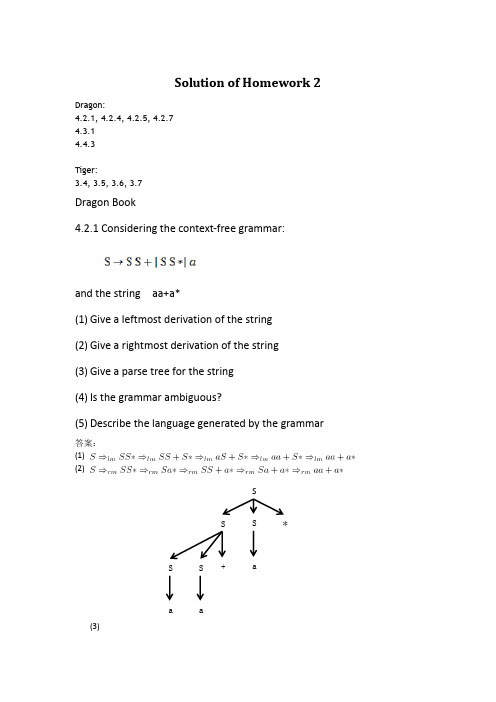
Solution of Homework 2Dragon:4.2.1, 4.2.4, 4.2.5, 4.2.74.3.14.4.3Tiger:3.4, 3.5, 3.6, 3.7Dragon Book4.2.1 Considering the context-free grammar:and the string aa+a*(1)Give a leftmost derivation of the string(2)Give a rightmost derivation of the string(3)Give a parse tree for the string(4)Is the grammar ambiguous?(5)Describe the language generated by the grammar答案:(1)(2)(3)SSS* S S+a aa(4)没有二义性(5)只含+和*,操作数均为a的算术表达式的后序遍历4.2.4 Show that [] and {} extension do not add power to grammars.答案: S->[a] 等价于S->S->{a} 等价于S->S’S’ -> ’4.2.5 Use notations from 4.2.4 to simplify the following grammar:答案:stmt-> if expr then stmt [else stmt]| begin stmtList endstmtList -> stmt{;stmt}4.2.7 A grammar symbol X (terminal or non-terminal) is useless if there is no derivation of the form . That is, X can neverappear in the derivation of any sentence.(1) Give an algorithm to eliminate all productions contains useless symbols(2) Apply your algorithm to grammar:S-> 0 | AA-> ABB->1答案:(1)注意:首先要考虑产生式是否终止,其次考虑是否在产生式中出现(a)求出非终结符是否终止对于每个非终结符X若X存在产生式不含非终结符,则X终止否则,对于X的每个产生式中的非终结符,若含有X,则X不终止,否则,若每个非终结符均终止,则X终止,否则不终止(b)去掉useless令文法G为空从起始的非终结符X开始对于X的每个产生式P,若P不含非终结符,则将X->P加入文法G否则,若P中每个非终结符均终止,则将X->P加入文法S’,并对每个非终结符X’递归调用这个过程返回文法G算法并不唯一,这只是一个很罗嗦的实现(2)对于这里给出的算法首先S和B终止,A不终止然后从S->0开始,S->0加入文法GS->A,A不终止,至此递归调用结束所以最终返回结果S->04.3.1 The following grammar for regular expressions over symbols a andb only.(1)Left factor this grammar(2)Does left factoring make the grammar suitable for top-down parsing?(3)Eliminate left recursion from the original grammar(4)Is the resulting grammar suitable for top-down parsing?答案:(1)rexpr -> rexpr + rterm | rtermrterm -> rterm rfactor | refactorrfactor -> rfactor * | rprimaryrprimary-> a| b(2)不可以,因为存在左递归(3)rexpr -> rterm rexpr’rexpr’-> + rterm rexpr’ |rterm-> rfactor rterm’rterm’ -> rfactor rterm’ |rfactor-> rprimay rfactor’rfactor’-> *rfactor’ |rprimary-> a | b(4)可以4.4.3 计算练习4.2.1中文法的FIRST和FOLLOW集合答案:FIRST(S)=aFOLLOW(S)= $a+*Tiger Book3.4 Write a grammar that accepts the same language as Grammar 3.1, but that us suitable for LL(1) parsing. That is, eliminate the ambiguity, eliminate the left recursion, and (if necessary) left-factor.Grammar 3.1:S -> S; SS -> id := ES -> print ( L )E -> idE -> numE -> E + EE -> ( S , E )L -> EL -> L , EAnswer:S -> id := E ; SS -> print ( L ) ; SE -> ( S , E )E -> id E’E -> num E’E’ -> εE’ -> + EL -> E L’L’ ->εL’ -> , E L’3.5 Find nullable, FIRST, and FOLLOW sets for the grammar; then construct the LL(1) parsing table.S’ -> S $S ->S -> X SB -> \ begin { WORD }E -> \ end { WORD }X -> B S EX -> { S }X -> WORDX -> beginX -> endX -> \ WORDAnswer:3.6a. Calculate nullable, FIRST, and FOLLOW for this grammar:S -> u B D zB -> B vB -> wD ->E FE -> yE ->F -> xF->b. Constructor the LL(1) parsing table.c. Give evidence that this grammar is not LL(1).d. Modify the grammar as little as possible to make an LL(1) grammar that accepts the same language.Answer:a)c) b中构建的LL(1)转换表中含有包含多个语法规则的表项,所以该语法不是LL(1)语法。
Homework2
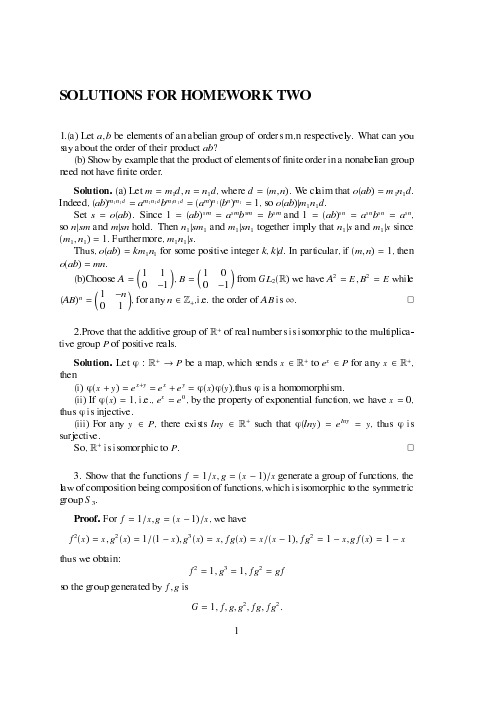
= m1 d, n = n1 d, where d = (m, n). We claim that o(ab) = m1 n1 d. m n d Indeed, (ab) =a b = (am )n (bn )m = 1, so o(ab)|m1 n1 d. sm Set s = o(ab). Since 1 = (ab) = a sm b sm = b sm and 1 = (ab) sn = a sn b sn = a sn , so n| sm and m| sn hold. Then n1 | sm1 and m1 | sn1 together imply that n1 | s and m1 | s since (m1 , n1 ) = 1. Furthermore, m1 n1 | s. Thus, o(ab) = km1 n1 for some positive integer k, k|d . In particular, if (m, n) = 1, then o(ab) = mn.
→
G
2
6. Let W be the additive subgroup of linear equations AX form a coset of W .
Rm
of solutions of a system of homogeneous
=
0. Show that the solutions of an inhomogeneous system AX
1
9. Consider the set U of real 3
(a) Prove that U is a subgroup of S Ln (R). (b) Prove or disprove: U is normal. (c) Determine the center of U . Proof (a) It is easily veri ed that U is closed with respect to the multiplication of matrices. Moreover, the identity I3 is in U , and the inverse matrix of every element of U is its adjoint matrix, which is also contained in U . So U is a subgroup of S Ln (R). (b) U isn't a normal subgroup of S Ln (R). For example, choose
5BM1 M2 英语课后作业
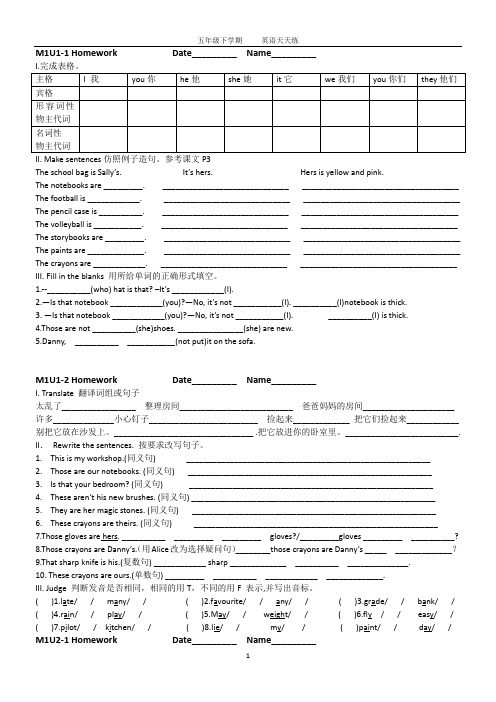
M1U1-1 Homework Date_________ Name_________The school bag is Sally’s. It’s hers. Hers is yellow and pink.The notebooks are _________. _____________________________ ____________________________________ The football is ____________. _____________________________ ____________________________________ The pencil case is __________. _____________________________ ____________________________________ The volleyball is ___________. _____________________________ ____________________________________ The storybooks are _________. _____________________________ ____________________________________ The paints are _____________. _____________________________ ____________________________________ The crayons are ____________. _____________________________ ____________________________________ III. Fill in the blanks 用所给单词的正确形式填空。
